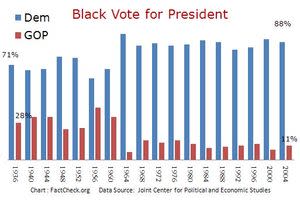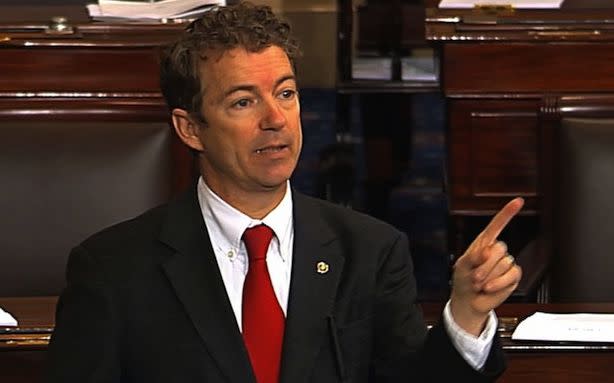Rand Paul's Twisted History Blames GOP Race Problem on Depression-Era Gifts
As promised, Rand Paul offered a lesson on the secret history of the Republican Party and black people in a speech to students at Howard University, a historically-black college, on Wednesday. Paul's version of history was not all that different than the one offered last month at CPAC's "Trump the Race Card" panel, a history that goes something like this: Republicans believed in emancipation and abolition and were radically not racist in the 19th century and… let's just skip over the last half of the 20th century. Paul said that Republicans saw a significant drop in support from black people from the 1960s on, not because of the party's calculation that it could win elections by appealing to the prejudices of racist Southerners, but because Democrats offered a bunch of handouts during the Great Depression. Paul said:
I think what happened during the Great Depression was that African Americans understood that Republicans championed citizenship and voting rights but they became impatient for economic emancipation.
African Americans languished below white Americans in every measure of economic success and the Depression was especially harsh for those at the lowest rung of poverty.
The Democrats promised equalizing outcomes through unlimited federal assistance while Republicans offered something that seemed less tangible-the promise of equalizing opportunity through free markets.
Rand Paul's explanation for how Republicans lost the support of black voters sounds a lot like Mitt Romney's explanation for why he lost the 2012 election — that Obama won because he offered "gifts," "especially the African-American community, the Hispanic community and young people." Rand Paul's explanation is wrong. Paul did not mention that the New Deal is why white people voted for Democrats, too. (At left, the electoral college maps for the presidential elections in 1932, 1936, and 1940.) And Dwight Eisenhower got 39 percent of black voters' support in 1956. That means there's another explanation.
RELATED: Parties Fight Over Who Gets to Talk About Slavery
Paul only got to it when asked by a student whether he was from the Republican Party of Abraham Lincoln or "post-1968 Republican party — Richard Nixon, Ronald Reagan." Paul disagreed that there was any difference between the Lincoln party and the Reagan one. "People perceive those as being completely different parties," Paul said. He explained:
"The argument that I'm trying to make is that we haven't changed. We don't talk about it... There are some of us who haven't changed, who are part of that party that you liked, who truly believe that Reagan was still part of that. Who don't see an abrupt difference."
There is a difference! Ronald Reagan kicked off his 1980 general election campaign near Philadelphia, Mississippi, a place that is solely famous for being the site of there civil rights murders. Reagan invented "welfare queens." In the 1990s, Newt Gingrich said he would crack down on crime by building emergency prisons and advertising longer sentences on "MTV and rap radio." Rand Paul's father Ron Paul made millions of dollars selling newsletters that warned of a looming "race war." This is not disputed history. Republican National Committee chair Ken Mehlman apologized for the Southern Strategy in 2005.
RELATED: Now It's Santorum's Turn to Learn the Downside of Media Attention
It is great that Paul wants to reach out to new voters. It is fantastic that the GOP wants to compete for black voters. These are obviously good things. But voters deserve a little bit of honesty about very recent history. Paul seemed surprised when Howard students were better versed in black GOP history than he was. Paul tried to explain that the first black senator was a Republican — but stumbled when he was "blanking on his name." The crowd shouted that it was Edward Brooke. Paul tried another fact. "If I would have said, 'Who do you think the founders of the NAACP were? Do you think they were Republicans or Democrats?' Would everybody in here have known they were all Republicans?" "Yes!" the crowd shouted. "Alright, alright," Paul admitted, "you know more than I know."



